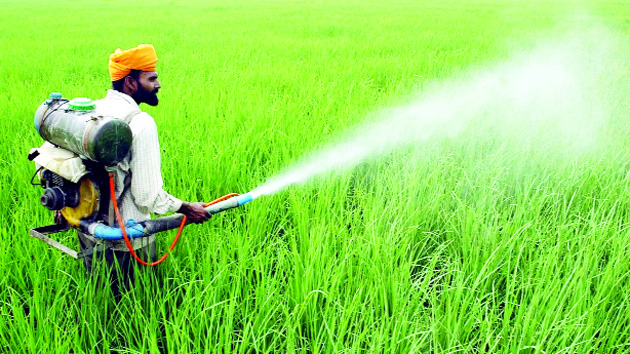Biju Dharmapalan
Success in agriculture is closely linked to increased use of pesticides. Even though humans have been using chemicals for controlling pests since time immemorial, the rampant use of toxic chemicals like arsenic, mercury, lead etc started during the early 20th century. In fact, the green revolution that focussed on increasing the productivity of crops expedited its usage. Pesticides are chemical compounds specifically formulated to combat and eliminate pests. This category includes a wide range of substances used to control and eliminate many types of organisms, such as plants, insects, nematodes, molluscs, fish, birds, rodents, bacteria, fungi, and lampreys. Herbicides are the most widespread type of pesticide, accounting for nearly 50% of pesticide consumption worldwide. Predominantly, pesticides are designed to serve as botanical defence agents, shielding plants from the threats of weeds, fungi, or insects. A pesticide is a chemical molecule, like carbamate, or a biological agent, such as a virus, bacterium, or fungus, that prevents, incapacitates, eliminates, or otherwise discourages pests. The Food and Agriculture Organization (FAO) has defined pesticide as, “any substance or mixture of substances intended for preventing, destroying, or controlling any pest, including vectors of human or animal disease, unwanted species of plants or animals, causing harm during or otherwise interfering with the production, processing, storage, transport, or marketing of food, agricultural commodities, wood and wood products or animal feedstuffs, or substances that may be administered to animals for the control of insects, arachnids, or other pests in or on their bodies. The term includes substances intended for use as a plant growth regulator, defoliant, desiccant, or agent for thinning fruit or preventing the premature fall of fruit. Also used as substances applied to crops either before or after harvest to protect the commodity from deterioration during storage and transport.”
Various scientific studies have shown that pesticide exposure is linked with health issues like cancer, neurodegenerative diseases, birth diseases, reproduction disorders etc. These can vary in severity depending on factors like the type of pesticide, duration of exposure, and individual susceptibility. Pesticides can harm non-target organisms, including beneficial insects (like bees), birds, aquatic life, and soil microorganisms. This disrupts the ecological balance and can lead to unintended consequences for the environment. Pesticides can leach into groundwater or be carried by runoff into nearby water bodies, potentially contaminating drinking water sources and aquatic ecosystems. Continuous use of certain pesticides can lead to soil degradation, affecting its fertility and long-term productivity.
Presently every vegetable, fruit or spice that is produced in our country has the residues of pesticides. The pesticides not only affect the health of the consumers, but they also badly affect the farmers who produce them. The farmers are exposed through skin, inhalation and ingestion during the application of these pesticides. The common adage ‘An apple a day keeps the doctor away” is no longer relevant today. Millions of tonnes of chemicals like chloropyriphos, mancozeb, captan, dimethoate, phosaloneetc are used by the orchard farmers in the once pristine Kashmir valley itself. The unscrupulous use of these chemicals has resulted in the increased incidence of brain tumours among the orchard farmers. In spices like cardamon that everyone chews raw as a mouth freshener presence of highly toxic ‘cypermethrin’ has been reported. Sometimes the adverse effects of these pesticides are so severe that it is affecting many generations. For example, the notorious case of aerial spraying of endosulfan in the cashew estates of Kasaragod in Kerala for over 20 years, caused congenital anomalies associated with the brain, like mental retardation and also cerebral palsy. In India, the total volume of pesticide manufacturing for the fiscal year 2022 amounted to 299 thousand metric tonnes.
Even though the Ministry of Agriculture and Farmers Welfare has outlined instructions for the safe use of pesticides, which include the use of protective clothing to cover the whole body while handling, these are not effective and mostly not followed in principle. Reducing the adverse effects of pesticides on farmers’ health involves implementing a combination of preventive measures, proper handling and application techniques, and alternative pest management strategies. Even the traces of pesticides that are stuck to their clothes and body surfaces are enough to cause health issues to them and their dear ones through close contact. Even in farms managed by the government, no one is concerned about the lives of farmers or workers. A few years back researchers at the Institute for Stem Cell Science and Regenerative Medicine (InStem), Bangalore led by Praveen K. Vemula developed a gel, poly-Oxim, to give protection to farmers.The gel does not function as a physical barrier but rather functions as a catalyst to render organophosphate inactive. The team also developed innovative fabric technology that can give protection to farmers. Unfortunately, these technologies have not reached the grassroots level, which may be due to the cost involved.
Unlike medicines prescribed for human consumption that need the prescription of a qualified medical practitioner, pesticides can be easily bought directly from the stockist. The government needs to restrict the sale of pesticides. The pesticides should be sold only with a prescription from a local agriculture officer or recognized agricultural graduate. This will reduce the unscrupulous use of these toxic chemicals. Similarly, the companies selling pesticides should provide protective gear for handling along with the pesticides. Government agencies should ensure that the provided protective equipment is of high quality and regularly inspected for effectiveness.The government should promote organic farming by providing special incentives to farmers practising that. It’s better to die without food than to eat toxic chemicals that provide debilitating effects on our health.
(The author is an adjunct faculty at the National Institute of Advanced Studies, Bangalore)
Trending Now
E-Paper


